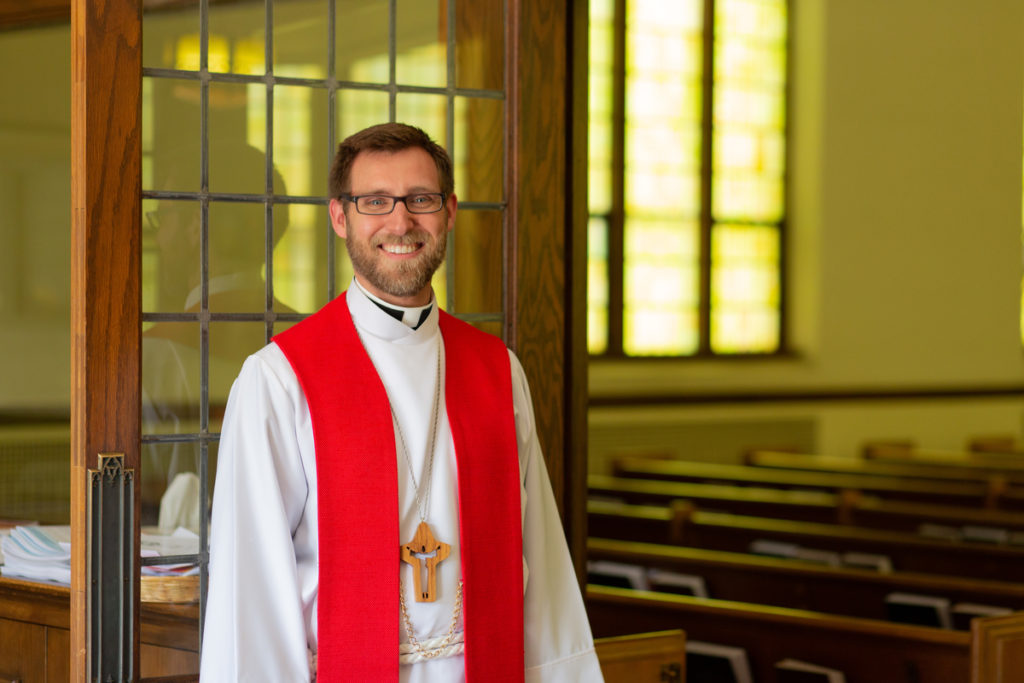On August 25, 2010, at a meeting of Lutheran CORE that would at its close give birth to the separate organization of the North American Lutheran Church (NALC), I wrote this in my blog:
What the upcoming internet broadcasts and book are sure to fail to convey, however, is the sense of hopeful expectancy that characterizes these proceedings. The Spirit is definitely doing something amazing, as seemingly just the right people with just the precise expertise needed to tackle the issues before us as a church have been assembled from the disparate corners of North American Lutheranism. Not only has this been an immensely satisfying—though extremely challenging—couple of days intellectually, it has also been so emotionally and spiritually. … Simply put, it is humbling to be here.
Because I had just taken a call at an ELCA church whose statement of faith aligned with that of Lutheran CORE but who needed to yet have the conversation about whether they could maintain that position within the ELCA, I would not join the ranks of the NALC for another 5 years. When I finally did become a pastor of the NALC, it felt nice to simply breathe easily for a while; to not feel like I was fighting every aspect of the institution that was supposed to help me proclaim the gospel just for the opportunity to do so.
No More Easy Breathing
Nine years into the NALC’s life, the time for breathing easy is over.
Oh, we seem to be handling our inevitable disagreements healthfully, without a trace of the Politburo-style ecclesiastical maneuvering we all experienced within the ELCA, where, to paraphrase Orwell, it was clear that “some Christians are more equal than others.” There is also no hint of doctrinal departure from Great Tradition Christianity or the revisionist hermeneutics that breed the same—yet.
I add the “yet” in that last sentence not because I see it happening now but can foresee it happening before my funeral liturgy. I foresee this as I teach my confirmation class full of 7th and 8th graders and my Tuesday morning Bible study full of 70 and 80 year olds, because I see the vast distance between the experiential, intellectual, and imaginative worlds they inhabit. The older group are largely unaware of how different the world the young live in is from the one they grew up in and they are shocked when I acquaint them with some of its contours. The young are being trained by their schools, entertainment, and constant diet of technology to view the older as at best hopelessly out of touch with the self-evidently true and even scientifically “proven” categories of the new (liberal) orthodoxy. At worst, they are being trained to view them as oppressors to be forcefully sidelined, re-educated—and if necessary, silenced.
Oh, the latter, rage-filled part of that progression will largely not come until their thorough catechesis into the new civic religion at the collegiate level, but the foundations are being laid far earlier. Six years ago, I had a youth group member inform me that she was an “LGBT ally,” and many more former youth group members have done the same. Some of these had attended the local evangelical Christian high school. Others were attending an evangelical fellowship in college and were even engaged in active Christian outreach on campus.

Could I have imagined such a reality, coming of age in the 1980’s? Could my Bible study participants, doing the same in Eisenhower’s America, have imagined it? Could the founders of the NALC imagine, less than a decade ago, that a local fire company would raise money by offering as bingo prizes not homemade jams and pies but sex toys or the billboard pictured with this article, planted in the heart of historically Pennsylvania Dutch country? Could they imagine that people could be publicly shamed and careers summarily ended for even questioning whether a person’s experience of being in the wrong body could be anything other than an absolute and legitimate expression of identity?
It is a brave new world.
The Authority of Holy Scripture
I focus on the sexuality issues not because of any inherent interest in them, but because as Dr. Robert Gagnon noted so many years ago, you cannot espouse the new, affirming positions on these issues without evacuating the Bible of its authority as Holy Scripture and the Word of God. You cannot affirm the authority of Genesis while espousing a “non-binary” (Trans) view of human sexuality. As the ELCA has recently confirmed, without a high view of Biblical authority, you cannot assert the uniqueness and necessity of Jesus Christ for human salvation. It was by reflection upon the books that we know as the canonical New Testament that the Council of Nicaea shifted from being predominantly Arian in its view of Christ to articulating the doctrine we know as the Hypostatic Union with near uniformity. (Not surprisingly, Arius and a close personal friend held out for their own view against the assembly.) It was fifteen years ago that an ELCA pastor brazenly asserted to me as a seminarian at a regional youth gathering that, “we only know about the Trinity from the Bible; God could easily be more like the Hindu idea of Brahmin, having countless avatar pseudopods to minister to the ‘endlessly diverse people’ s/he has created.’”
Without a high view of Biblical authority, we can glean from its pages the sorts of vaguely inspiring ideas about God that are largely our projections in the first place, but we cannot receive revelations about God—or about God’s will for us, His creatures.
Danger of Theological Revisionism
And that is exactly what theological revisionism is all about; it is about recasting God’s revelations as human conceptions, and once everything is a human conception, all is mere politics, the rules of which we know well from Plato, Hobbes, Machiavelli, Nietzsche, and Foucault… not to mention Marx, Lenin, Mao, and Alinsky. In such a world, it is perfectly legitimate for the philosopher-kings-and-queens to determine which views are “more equal than others” and to eliminate cross-examination in the interest of “justice.”
And this is exactly what is happening. Consider this letter sent by ‘We, few of the Black students here at Pomona College and the Claremont Colleges’ to the administration of Claremont McKenna College, who had dared to permit conservative scholar Heather Mac Donald to speak on campus:
Historically, white supremacy has venerated the idea of objectivity, and wielded a dichotomy of ‘subjectivity vs. objectivity’ as a means of silencing oppressed peoples. The idea that there is a single truth – ‘the Truth’ – is a construct of the Euro-West that is deeply rooted in the Enlightenment, which was a movement that also described Black and Brown people as both subhuman and impervious to pain. This construction is a myth and white supremacy, imperialism, colonization, capitalism, and the United States of America are all of its progeny. The idea that the truth is an entity for which we must search, in matters that endanger our abilities to exist in open spaces, is an attempt to silence oppressed peoples.[1]
Unlikely Ally
Douglas Murray recounts the incident in his recent book The Madness of Crowds. If a gay intellectual from Great Britain seems an unlikely ally of a Christianity that is both evangelical and catholic, read the way he goes on to analyze this letter:
“‘The Truth’ is a construct of the Euro-West. It is hard to think of a phrase which can at one and the same time be so wildly misguided and so dangerous in its implications. If ‘the Truth’ (in scare quotes) is a white thing, then what is everyone else meant to live in and strive towards?”
Stalin pithily noted, “Ideas are far more powerful than guns. We don’t let our people have guns. Why should we let them have ideas?” Our young people are being deprived of the most important idea ever, an idea that is not white or black, gay or straight, Christian or otherwise; they are being systematically deprived of the idea of truth. Furthermore, they are being taught that the pursuit of it is disloyal, bigoted, and dangerous.
Future Outlook of the NALC
As a fellow NALC clergyman noted to me recently, “The NALC was formed at the last possible moment it could have been, historically-speaking.” This undoubtedly displays an admirable ecclesiological instinct, for it is indeed part of Great Tradition Christianity that the Church of Jesus Christ is “one, holy, catholic, and apostolic.” It also sets forth the challenge clearly before us, as it was founded by people I would categorize as the last well-catechized generations. Here I refer to their catechesis not only with the Church, but their cultural catechesis as well. Most of us on the clergy roster of the NALC are still here because we underwent a migration made necessary by counter-cultural convictions. What will become of the NALC as its first native-born daughters and sons rise to offices of prominence within the church? Philosophy was once described as the handmaiden to theology because it provided categories of meaning that helped people do the very difficult work of theology. What will happen to the church’s proclamation when its young pastors have not been formed in the fundamental categories of meaning that make clear thinking about the Bible possible? What will happen to it if they are convinced by their primer school training that to even consider certain ideas makes them the moral equivalent of a Nazi?
Students of Christian history can broadly trace the theological revisionism of our day back through the social gospel movement of the early 20th century to the “higher critics” of the Enlightenment. It is a history of more than ideas; it is a history of people, of champions of ideas who viewed themselves as the saviors of a movement with some social utility (Christianity) whose convictions were hopelessly backwards and out of touch with the “obvious truths” of the modern world. For all orthodox Lutherans, the NALC included, the challenge is to catechize a new generation of theologians from elementary school age on up in an intentionally countercultural way. We will need to be aware of the prevailing ideas and neologisms that are being introduced in a deliberate ploy to undermine a worldview congruent with that of orthodox Biblical Christianity. As Christians, we have no stake in Western culture qua Western culture, but to the degree that what we know as Western culture is the product of Christian theology, including its emphasis on truth as a fundamental category of meaning, we need to advocate for what is in imminent danger of being lost.
Written nearly thirty years ago, in his classic book The Once and Future Church, Loren Mead noted that the West was becoming the Church’s new mission field and that state church traditions like Lutheranism, used as they were to cultural underwriting of their religious project, were likely to have the most difficulty adapting to this new reality. It remains for us to determine whether his words were merely cautionary… or prophetic.
We Must Teach All Our People
Most importantly of all, we need to communicate to our people from the oldest to the youngest how the orthodox Biblical teachings on creation and fall, judgment and grace, repentance and forgiveness, faith and obedience, spiritual bondage and true freedom are more compelling and truly loving than the secular narratives with which they are being daily indoctrinated. We must teach them who God is and who we are meant to be as creatures made in His image but defaced by sin almost to the point of being unrecognizable. We must teach them that because of that reality, no matter the strength of our emotions, our own narratives about our inner lives are not the most reliable story about ourselves, but rather God’s story about us, recounted in the Bible, holds primacy of place.
We must do this knowing that our work is being undermined both by determined ideologues and well-meaning people engaged in herd behavior, what Murray accurately deems “the madness of crowds.” We must be clear with them that this dynamic is going to be part of their experience as Christians in this culture without becoming reactionary or uncharitable toward those who hate us.
In one of the responses to my Postmodernism articles, I was accused of being a “reactionary theologian.” I confess that I have never heard the term before, but it sounds like the sort of jingoistic turn of phrase intended to make the hard work of thinking through complex issues unnecessary—a word like “anti-revolutionary.” On the August day in 2010 recounted earlier, Dr. Steven D. Paulson reminded the gathered assembly that Martin Luther had noted that “it is a characteristic of love to be easily deceived.” We must highlight this reality and remind them that their love—especially their love of friends and the consequent alliances they make with them—like the rest of themselves, is fallen, disordered, and so, unreliable until it is conformed to the revealed Word of God.
The Frog
We all know the old saw. How do you boil a frog? If you put him in hot water he will jump out before he gets too injured, but if you put him in cold water and turn up the heat slowly, he will be boiled before he knows what happened to him.
Most reading this article have spent our lives watching the Lutheran frog being boiled. Some of us felt the  need to “go out and be separate.” If we hope to not see our frogs boiled in the way other communions have unfortunately experienced, we will need to be intentionally countercultural. Our catechesis and our sermons will need to be apologetic in tone, whether we are apologists by vocation or not. We will need to listen carefully to a world that hates us so we may build bridges to their linguistics worlds of meaning and so that we can dismantle Trojan Horses meant to destroy Christianity and its necessarily attendant, coherent worldview from within.
need to “go out and be separate.” If we hope to not see our frogs boiled in the way other communions have unfortunately experienced, we will need to be intentionally countercultural. Our catechesis and our sermons will need to be apologetic in tone, whether we are apologists by vocation or not. We will need to listen carefully to a world that hates us so we may build bridges to their linguistics worlds of meaning and so that we can dismantle Trojan Horses meant to destroy Christianity and its necessarily attendant, coherent worldview from within.
In 1809, biographer Thomas Charlton popularized the phrase, “the price of liberty is eternal vigilance” in our newly-birthed republic. The bloody reign of terror had just recently ended in France, a cautionary tale for those who might have complacently believed that the new order was enough to insure against future tyranny.
We ought to take a lesson from this page of history. The price of the liberty that the true gospel of Jesus Christ alone can bring is free, but the price of preaching that gospel fully and faithfully is eternal vigilance.
Vigilance Required
On August 26, 2010, as the
theological conference transitioned to the constituting convocation of a
re-visioned Lutheran CORE, I reflected in my blog that “it was time to see if
this dog would hunt.” Could the ideas we
had bandied about for two days now become incarnate, take on flesh in a living
institution that actually facilitated the living proclamation of “the eternal
gospel” in the ways God has ordained that it should?
As I reflect on the state of the Church and the
nature of its current mission in the wake of Reformation Sunday, I give thanks
that it could happen, but I note that we are sitting in water that seems to be
already getting warm. Vigilance is
required.
[1] Murray, Douglas. The Madness of Crowds . Bloomsbury Publishing. Kindle Edition.


























